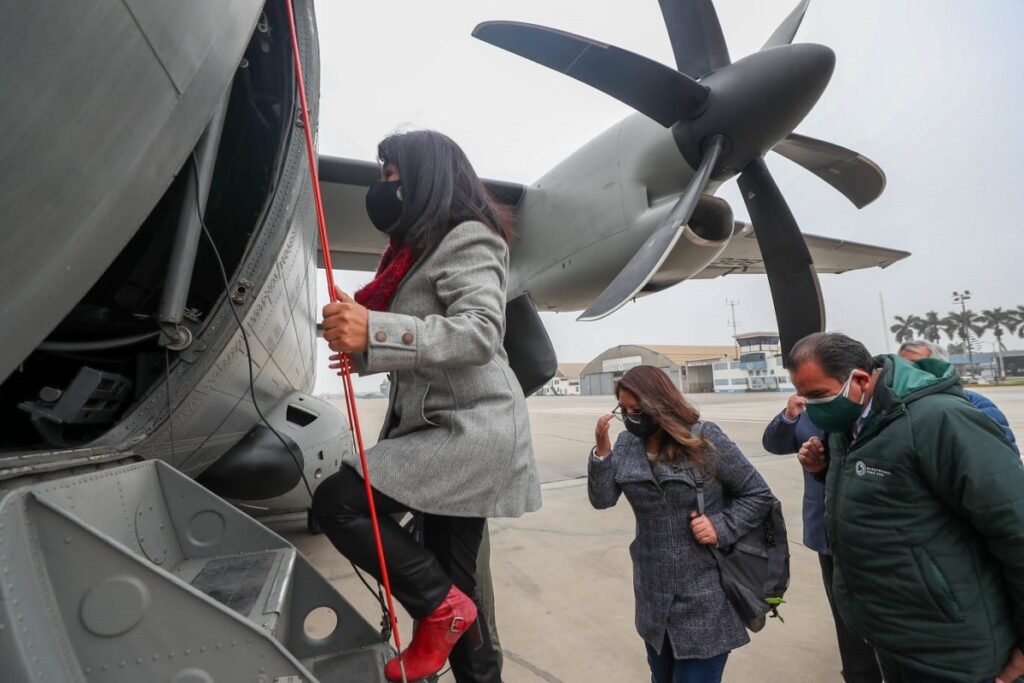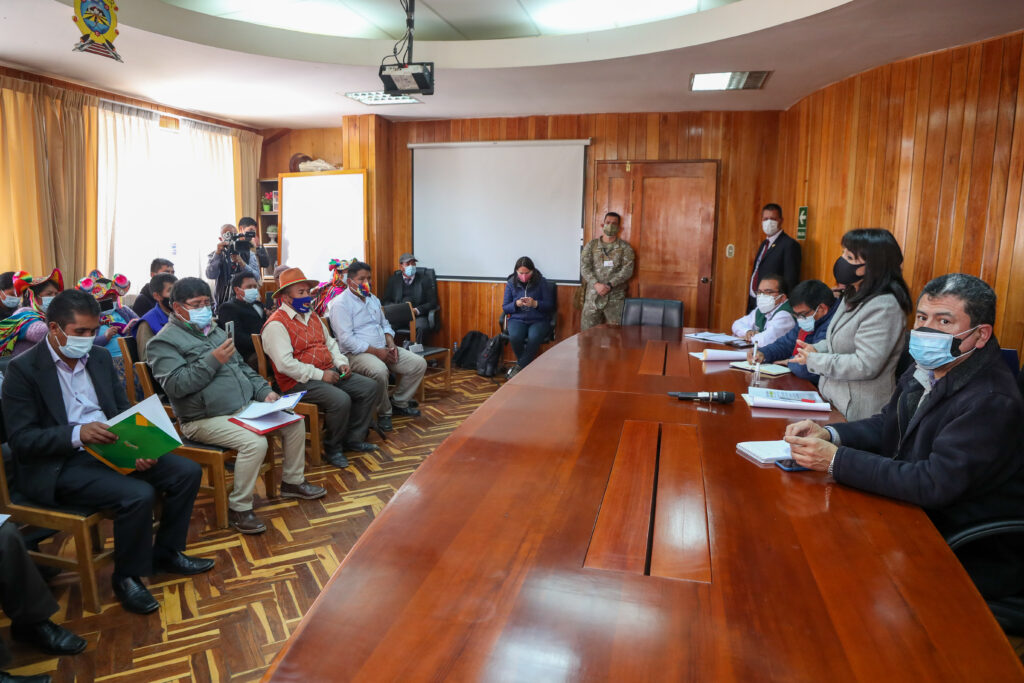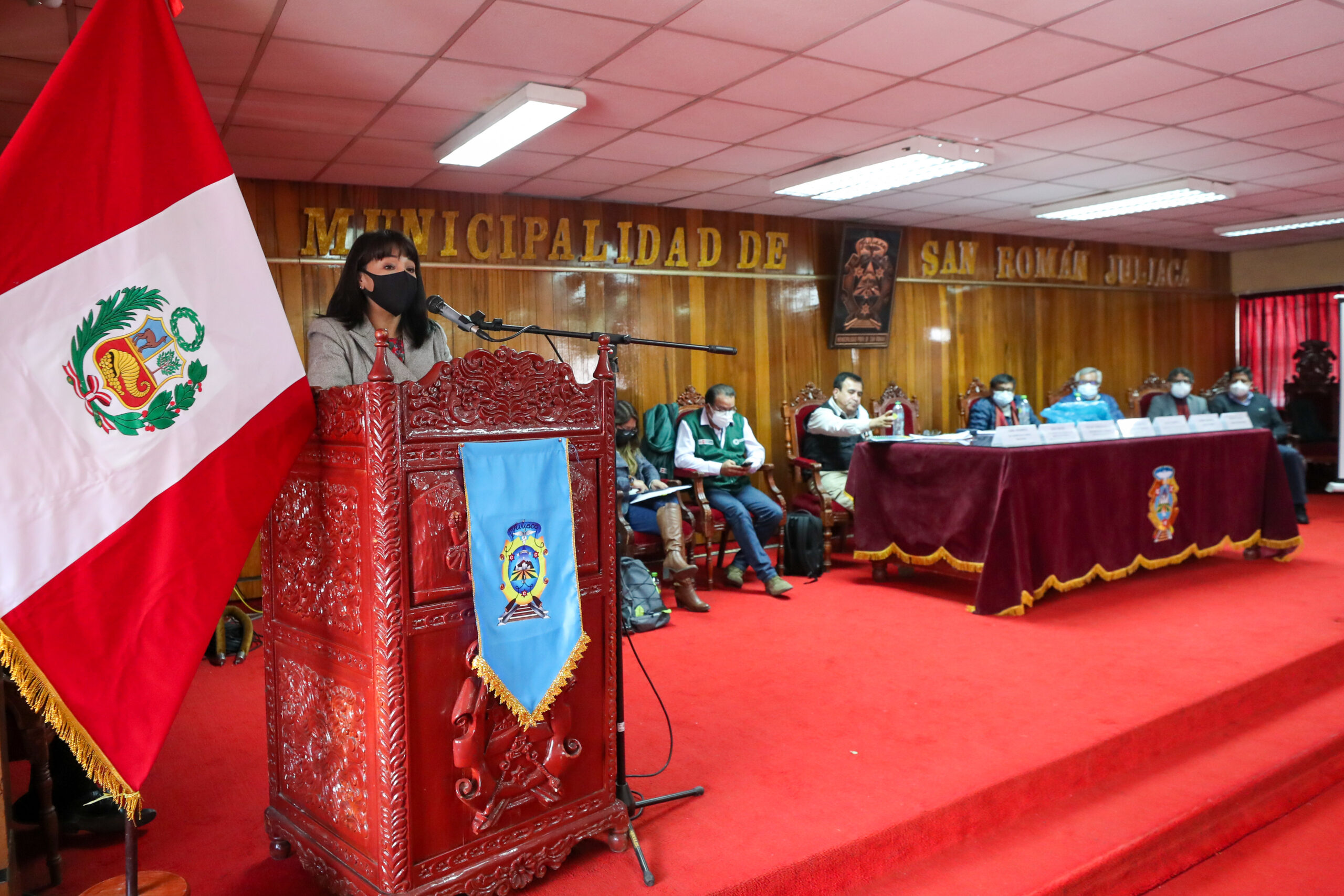Agencia Peruana de Noticias PRENSAPERU.PE https://prensaperu.pe Twitter: @prensaperupe La presidenta del Consejo de Ministros, Mirtha Vásquez, instaló hoy en Juliaca, Puno, la mesa técnica multisectorial que analizará la problemática de los pequeños productores de hoja de coca del departamento y propondrá soluciones para mejorar la respuesta del Estado ante las necesidades y demandas de los agricultores.
En ceremonia realizada en la Municipalidad Provincial de Juliaca quedó instalado dicho grupo de trabajo, que está integrado por los representantes de la Presidencia del Consejo de Ministros (PCM), de los ministerios del Ambiente, Interior, de la Producción (Produce), de Desarrollo e Inclusión Social (Midis) y de Desarrollo Agrario y Riego (Midagri), así como de la Empresa Nacional de la Coca (Enaco) y de la Comisión Nacional para el Desarrollo y Vida sin Drogas (DEVIDA). También participarán delegados del gobierno regional de Puno, de las municipalidades provinciales y distritales de Carabaya y Sandia y de la sociedad civil, según la Resolución Ministerial N° 250-2021-PCM, publicada hoy en el diario oficial “El Peruano”.

Durante el acto de instalación de dicho grupo de trabajo, la premier Mirtha Vásquez señaló que por muchos años se ha ignorado la problemática de los pequeños productores de hoja de coca para el mercado interno y el uso milenario tradicional. “La estrategia contra las drogas se ha manejado desde un Estado que ha diseñado cómo intervenir sin escuchar a la población”, agregó.
También aseguró que la erradicación de los sembríos ilegales de hoja de coca para fines ilícitos va a continuar, porque “no se va a favorecer a los traficantes de drogas”. Sin embargo, destacó la necesidad de diferenciar a las poblaciones postergadas que han vivido tradicionalmente del cultivo milenario de la hoja de coca con los que le dan un mal uso y que están comprometidos con el tráfico de drogas, “un mal absolutamente pernicioso y contra el que todos debemos de luchar”.
De otro lado, precisó que en la mesa técnica los representantes del Estado van a escuchar las demandas y necesidades de los pequeños productores y se abordará cómo plantear la erradicación y un nuevo empadronamiento para identificar a los nuevos productores, entre otros temas. “A partir de allí se vería cómo el país replantea la lucha antidrogas, porque en los últimos años la estrategia no ha funcionado, porque se han ido incrementado los cultivos ilícitos”, explicó.

Al acto de instalación asistieron viceministros y altos funcionarios de los ministerios que forman parte de la Mesa Técnica para la atención de la problemática de la hoja de coca en el departamento de Puno, así como autoridades regionales y locales, y dirigentes de los agricultores cocaleros de esa región.
Durante su visita de trabajo a Puno, la primera ministra conversó también con las autoridades del municipio de Coata, sobre la problemática de la población que sufre graves consecuencias a causa de la contaminación por metales pesados. Asimismo, dialogó con alcaldes de diferentes distritos sobre la necesidad de viabilizar sus proyectos.
“Hemos tenido la oportunidad de hablar con los alcaldes de Juliaca, Puno, Coata y otros distritos. Ellos tienen varias demandas y proyectos importantes que tienen que ver con agua y saneamiento. Hemos atendido estos requerimientos y los vamos a tramitar con los respectivos ministerios”, señaló tras considerar que su visita al departamento fue fructífera.
Fuente: Agencia Peruana de Noticias PRENSAPERU.PE https://prensaperu.pe Twitter: @prensaperupe
English translation
The multisectoral technical table is set up on the problem of the coca leaf in Puno.
Peruvian News Agency PRENSAPERU.PE https://prensaperu.pe Twitter: @prensaperupe The president of the Council of Ministers, Mirtha Vásquez, installed today in Juliaca, Puno, the multisectoral technical table that will analyze the problems of small producers of coca leaf of the department and will propose solutions to improve the State’s response to the needs and demands of farmers.
In a ceremony held in the Provincial Municipality of Juliaca, said working group was installed, which is made up of representatives of the Presidency of the Council of Ministers (PCM), the ministries of the Environment, Interior, Production (Produce), and Development and Social Inclusion (Midis) and Agrarian Development and Irrigation (Midagri), as well as the National Coca Company (Enaco) and the National Commission for Development and Life without Drugs (DEVIDA). Delegates from the regional government of Puno, the provincial and district municipalities of Carabaya and Sandia and civil society will also participate, according to Ministerial Resolution No. 250-2021-PCM, published today in the official newspaper “El Peruano.”

During the act of setting up said working group, Prime Minister Mirtha Vásquez pointed out that for many years the problem of small coca leaf producers for the domestic market and the traditional millennial use has been ignored. “The strategy against drugs has been managed from a State that has designed how to intervene without listening to the population,” he added.
He also assured that the eradication of illegal coca leaf crops for illicit purposes will continue, because “it is not going to favor drug traffickers.” However, he highlighted the need to differentiate the neglected populations that have traditionally lived from the millenary cultivation of the coca leaf with those who misuse it and who are committed to drug trafficking, “an absolutely pernicious evil and against that we must all fight ”.
On the other hand, he specified that at the technical table the representatives of the State will listen to the demands and needs of small producers and will address how to propose eradication and a new registration to identify new producers, among other issues. “From there it would be seen how the country rethinks the fight against drugs, because in recent years the strategy has not worked, because illicit crops have been increasing,” he explained.

The installation ceremony was attended by vice ministers and senior officials of the ministries that are part of the Technical Table for attention to the problem of the coca leaf in the department of Puno, as well as regional and local authorities, and leaders of coca growers from that region.
During her working visit to Puno, the prime minister also spoke with the authorities of the municipality of Coata, about the problems of the population that suffers serious consequences due to contamination by heavy metals. Likewise, he spoke with mayors of different districts about the need to make their projects viable.
“We have had the opportunity to speak with the mayors of Juliaca, Puno, Coata and other districts. They have several important demands and projects that have to do with water and sanitation. We have met these requirements and we are going to process them with the respective ministries, “he said after considering that his visit to the department was fruitful.
Source: Peruvian News Agency PRENSAPERU.PE https://prensaperu.pe Twitter: @prensaperupe
